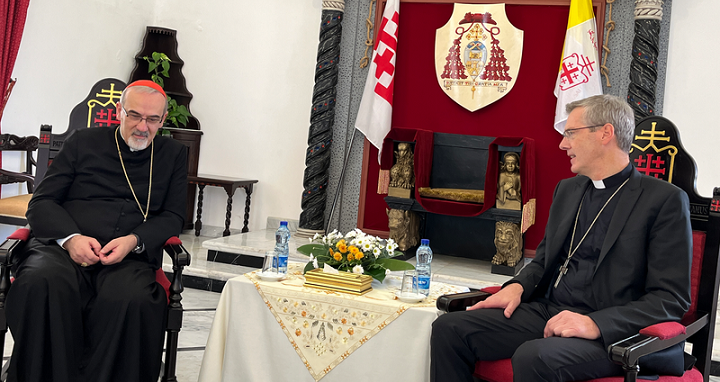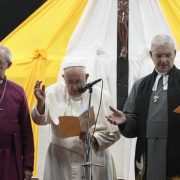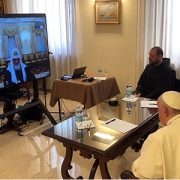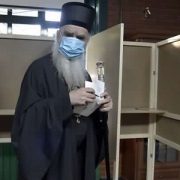
Discorso del vescovo Heiner Wilmer, presidente di Justitia et Pax tedesca, al termine della funzione religiosa in occasione della festa della Moltiplicazione dei Pani dell’11 novembre 2023.
Address by bishop Wilmer in English below
Beatitudine, Eminenza, cari fratelli nel ministero episcopale e sacerdotale, care sorelle e fratelli,
qui a Tabgha, il mondo sembra essere a posto. Non ci sono segni tangibili della guerra. Ma sappiamo che il silenzio di questo luogo è ingannevole. Solo pochi chilometri ci separano da una sofferenza schiacciante e indicibile.
Non è passato un giorno dalla mattina del 7 ottobre senza che ci siamo trovati di fronte a notizie e immagini devastanti: immagini di violenza e distruzione. Vedo le immagini dell’orribile attacco di Hamas, che ha superato ogni normale misura umana. Bambini e donne, anziani e giovani adulti, che avevano ancora una vita intera davanti a loro sono stati uccisi in modo brutale. Penso agli ostaggi che sono ancora nelle mani di Hamas e ai loro parenti che temono per loro. Possiamo solo condannare questo atto sanguinario, senza se e senza ma.
Lo Stato israeliano ha dichiarato guerra ad Hamas. E ha il diritto internazionale dalla sua parte. Ma ho anche davanti agli occhi le immagini della popolazione sofferente della Striscia di Gaza. Molti, troppi morti. La situazione umanitaria è scandalosa. Uomini, donne e bambini sono circondati dalle rovine. Vivono nella paura costante. E la maggior parte di loro non ha lo stretto necessario per sopravvivere.
E vorrei dire questo: sono solidale con le persone in Israele; e sono anche solidale con le persone in Palestina. Inoltre, sono vicino alle vittime della guerra a Gaza. Bisogna fare tutto il possibile per alleviare le sofferenze delle persone che vivono lì e per prevenire e porre fine all’uccisione di civili innocenti.
Ho già detto quanto mi toccano le immagini di sofferenza. Per questo non volevo più limitarmi a seguire gli eventi da lontano. Per questo mi sono recato in Terra Santa. Sono venuto per imparare; volevo e voglio ancora incontrare voi, le persone sul posto, di persona – anche se mi rendo conto che non ho molto altro da offrire se non la mia compassione e solidarietà. Questa compassione vale per tutti: israeliani e palestinesi – ebrei, drusi, musulmani e cristiani.
Il mio viaggio è stato caratterizzato da incontri ed eventi che mi hanno toccato nel profondo. Vorrei ringraziare in particolare lei, Beatitudine, caro cardinale Pizzaballa. Senza la sua spontanea disponibilità, la visita non sarebbe stata possibile. Grazie per la sua gentile ospitalità e per il tempo che mi ha generosamente concesso. Grazie per le profonde discussioni che abbiamo avuto.
Le nostre riflessioni sul ruolo e la responsabilità delle comunità religiose sono particolarmente preziose per me. Senza di esse non si può raggiungere una pace duratura in Terra Santa. Ecco perché il dialogo tra le comunità religiose è così importante. Papa Francesco non si stanca mai di ricordarcelo. Sono quindi lieto, in questi i miei giorni in Terra Santa, di aver incontrato rappresentanti dell’ebraismo e dell’islam, oltre che dei cristiani. Noi uomini e donne di fede non rappresentiamo partiti religiosi. Non dobbiamo essere sostenitori di interessi particolari. Siamo messaggeri di Dio per la pace.
Non voglio nascondere nulla: come vescovo di un paese il cui nome evoca ancora orrore tra i sopravvissuti alla Shoah, la visita di giovedì allo Yad Vashem mi ha colpito. Era l’anniversario della cosiddetta Reichspogromnacht (Notte dei cristalli). Esattamente 85 anni fa, negozi e sinagoghe ebraiche in Germania furono saccheggiati e dati alle fiamme e molte persone furono uccise. Nei giorni immediatamente successivi iniziarono le deportazioni nei campi di concentramento. E alla fine di tutto ci fu il genocidio degli ebrei europei. Deponendo una corona di fiori allo Yad Vashem, ho voluto dare l’esempio e oppormi a tutte le forme di antisemitismo.
Tuttavia, mi oppongo fermamente anche a qualsiasi odio generalizzato nei confronti dei musulmani e al disprezzo e alle minacce a cui sono esposti i cristiani. Non dobbiamo permettere che le persone vengano denigrate ed emarginate a causa della loro religione o etnia. Altrimenti tutti noi – e soprattutto voi qui in Terra Santa – non troveremo mai la pace.
Oggi la Chiesa locale di Gerusalemme celebra la festa della Moltiplicazione dei pani. Come abbiamo appena sentito, si rifà a una storia della Bibbia che ebbe luogo qui a Tabgha. C’erano solo due pesci e cinque pani. Eppure, su indicazione di Gesù, i discepoli riuscirono a sfamare una folla di 5.000 persone. Anche noi non abbiamo molto da offrire. Solo la nostra speranza di una pace giusta, la nostra volontà di raggiungere una pace giusta e le nostre azioni di pace giusta. Questi sono i nostri due pesci e cinque pani. Ma forse – a Dio piacendo – possiamo usarli per trasformare radicalmente questo mondo di discordia in cui oggi tutti voi state soffrendo. Forse vivremo il giorno della pace, che ha il suo fondamento nella giustizia per tutti.
Che la pace sia su di voi. Dio vi benedica tutti.
Address by Bishop Dr Heiner Wilmer SCJ at the end of the church service on the occasion of the feast of the miraculous Multiplication of the Loaves on 11 November 2023.
Your Beatitude, Your Eminence, Dear brothers in the episcopal and priestly ministry, Dear sisters and brothers,
here in Tabgha, the world seems to be all right. There is no sign of war. But we know: The silence of this place is deceptive. Only a few kilometres separate us from overwhelming and unspeakable suffering.
Not a day has gone by since the morning of 7 October 2023, without us being confronted with devastating news and images: images of violence and destruction. I see the images of the horrific attack by Hamas, which went beyond any normal human measure. Children and women, old people and young adults who still had a whole life ahead of them – they were murdered in a brutal manner.
I think of the hostages who are still in the hands of Hamas and of their relatives who fear for them. We can only condemn this bloody deed – without ifs and buts.
The Israeli state has declared war on Hamas. And it has international law on its side. But I also have the images of the suffering population in the Gaza Strip before my eyes. Many, all too many are dead. The humanitarian situation is outrageous. Men, women and children are surrounded by ruins. They are living in constant fear. And most of them lack the bare necessities to survive.
And I would like to say this: I stand in solidarity with the people in Israel. And I stand in solidarity with the people in Palestine. I also empathise with the victims of the war in Gaza. Everything must be done to ease the suffering of the people living there and to prevent and end the killing of innocent civilians.
I have mentioned how touched I am by the images of suffering. That’s why I no longer wanted to just follow the events from afar. That’s why I travelled to the Holy Land. As a learner, I wanted and still want to meet you, the people on the ground, in person – even though I realise that I have little more to offer than my compassion and solidarity. This compassion applies to everyone: Israelis and Palestinians – Jews, Druze, Muslims and Christians.
My trip was characterised by moving encounters and events. I would especially like to thank you, Beatitude, dear Cardinal Pizzaballa. Without your spontaneous willingness to help, the visit would not have been possible. Thank you for your kind hospitality and the time you generously gave me. Thank you for the deep discussions we had.
Our reflections on the role and responsibility of the religious communities are particularly valuable to me. Without them, lasting peace cannot be achieved in the Holy Land. That is why dialogue between the religious communities is so important. Pope Francis never tires of reminding us of this.
So, I am glad that during my days in the Holy Land I met representatives of Judaism and Islam as well as Christians. We men and women of faith do not represent religious parties. We must not be advocates of particular interests. We are God’s messengers for peace.
I do not want to conceal the following: As a bishop from a country whose name still evokes horror among survivors of the Shoah, Thursday’s (9 November 2023) visit to Yad Vashem has stayed with me. It was the anniversary of the so-called Reichspogromnacht (Night of Pogroms). Exactly 85 years ago, Jewish shops and synagogues in Germany were looted and set on fire, and many people were killed. In the days immediately afterwards, deportations to concentration camps began. And at the end of it all there was the genocide of the European Jews. By laying a wreath at Yad Vashem, I wanted to set an example and oppose all forms of anti-Semitism.
However, I also firmly oppose any generalised hatred of Muslims and the contempt and threats to which Christians are exposed. We must not allow people to be disparaged and marginalised because of their religion or ethnicity. Otherwise we all – and especially you here in the Holy Land – will never find peace.
Today, the local church in Jerusalem celebrates the feast of the miraculous Multiplication of the Loaves. As we have just heard, it goes back to a story in the Bible that took place here in Tabgha.
There were only two fish and five loaves of bread. And yet, on Jesus’ instructions, the disciples were able to satisfy the hunger of a crowd of 5,000 people. We don’t have much to offer either. Only our hope for a just peace, our willingness to achieve just peace and our deeds of just peace. These are our two fish and five loaves of bread. But perhaps – God willing – we can use them to fundamentally transform this world of discord that you are all suffering from today. Perhaps we will experience the day of peace, which has its foundation in justice for all.
May peace be upon you. God bless you all





